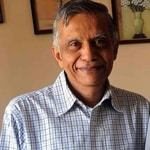
Journalists risking death while doing investigative stories or covering war is no news. If they invite death and disability just for a pleasure jaunt, it certainly is. Yes. It did happen once.
Newsmen had gathered at the Secunderabad Railway Station early on that fateful October 2, 1974 to cover the launch of Krishna Express to Vijayawada. The South Central Railway said the Express was the fastest in the zone and invited pressmen to join.
The Chief Minister, J. Vengal Rao, flagged off the train with a flourish. Why the talk of death and disability? To know, read on………
The reporters were supposed to stay put in the train instead of watching the flag-off. The Express gathered speed in no time on its maiden journey. They picked up a big row with the railway officials for leaving them in the lurch. The officials promised to stop the train at its next halt, but that did not happen.
It was then agreed to take them by road to catch up with the train or perhaps to enable them take the return trip. It remained a mystery why the reporters were hell-bent on catching the train or how it made sense to race with the fastest train by a van. The van which whizzed at terrific speed on the Hyderabad-Vijayawada national highway lost control, crashed against a tree, rose into the air and somersaulted, killing three journalists, three others and causing permanent disabilities to more.
The accident happened near Nakrekal, the spot dubiously known as ‘local Bermuda triangle.’ Turaga Krishnamohan Rao of All India Radio, Aziz of Telangana News Service, and TV Anand of Malayala Manorama, the driver, the cleaner and a villager were killed.
Ganti S. Mahadevan, my senior at Indian Express, GVK Murthy, my news editor at Deccan Chronicle, suffered multiple injuries while Hilal Murtuza of Rehnuma-e-Deccan, had his leg amputated.
I was assigned to cover the event, but willingly stood aside for Mahadevan who had some important work in Vijayawada. I was covering inauguration of Gandhi Gyan Mandir in Kothi when Sitapati, CM’s security officer, told us ‘your people were in a nasty mood. They caused big commotion at Secunderabad station’. A few hours later, in came the shocking news of the tragedy. Mahadevan had no regret swapping assignments with me. ‘Fate willed it that way,’ he would say with a smile.
Now about the Bermuda (tri) angle. I was in a press party going to Rajahmundry to cover the inauguration of the rail-cum-road bridge on the Godavari. I wanted to show Shyam Rao Harnoor (PTI), R.P. Rao (Hindusthan Times) and others the spot where the accident took place. The moment we reached the spot, the emergency door of the bus flung wide open. Fortunately, the window side passenger did not tumble out. The spot thus justified its Bermuda tag.
Tail-piece: Another case of man chasing death was Paradise Pentaiah, owner of the popular theatre in Secunderabad. The famous Paradise hotel has its roots in that theatre. Having missed a Vijayawada-bound train at Secunderabad, he hired a taxi and caught the express at Bhongir, only to be killed in an accident near Raghunathpally moments later. This was on September 28, 1954, the same day the swirling Musi had devastated Hyderabad in a macabre dance of death and ruin in 1908.
Dasu Kesava Rao is a seasoned journalist who has worked, among several newspapers, with The Hindu and served as its Bureau Chief in Hyderabad.
Get the latest updates in Hyderabad City News, Technology, Entertainment, Sports, Politics and Top Stories on WhatsApp & Telegram by subscribing to our channels. You can also download our app for Android and iOS.
ఇవి కూడా ఓ లుక్కేయండి ..
- Take stringent action against police for Majji’s suicide: TDP
- BJP to step up offensive against Jagan govt?
- This Independence Day, O2O optical chain MyValueVision.com is launching a 24×7 eye care on …
- East Godavari parents worried over TPR as schools set to open on August 16
- Passenger amenities inspected at Vijayawada, Rajamahendravaram railway stations
- SC Rly CCM inspects Vijayawada railway station
